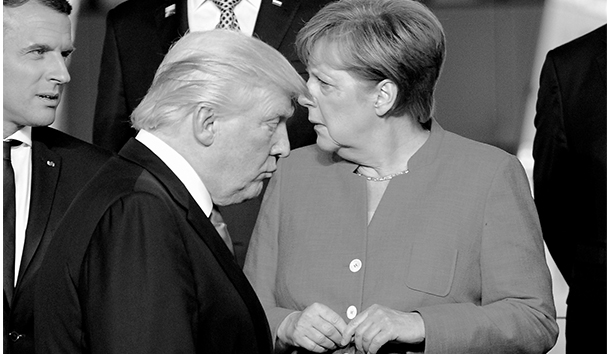The foreign policy of the Trump administration remains a mass of contradictions, with the White House evidently divided among nationalists, pragmatists, and certain advisors who prescribe an ever expanding hegemony. These rivals have clashed in recent weeks over the question of sending a surge of U.S. troops into Afghanistan—some 5,000 more to supplement the 8,400 who are already there. As proved by the administration’s air strikes against Syrian forces in April and the increasing tempo of small-scale military operations of all kinds, this White House is not allergic to the use of force. Voters who cast their ballots for Trump as the America First candidate who would keep the country out of more unwinnable wars in the Middle East have to wonder whether the President has already been swept out to sea by Washington’s imperial undertow.
Yet the foreign-policy establishment is genuinely unhappy—it isn’t getting what it wants in any systematic way, as it would be if a Bush or a Clinton were in office. There is a deep fear that, while Trump may be an ad hoc, tactical interventionist, his overall strategic disposition still favors reducing America’s long-term commitments. Trump may no longer say NATO is obsolete, but he keeps the alliance unsettled by insisting that our affluent allies pay their share for Europe’s defense. Trump sells arms to the Saudis and effectively underwrites their war in Yemen, yet he also took the occasion of his Riyadh speech to insist that “America is a sovereign nation and our first priority is always the safety and security of our citizens—we are not here to tell other people how to live, what to do, who to be, or how to worship.”
Those are not the words of a president whose administration is dedicated to exporting democracy and fomenting revolutions worldwide—the modus operandi of the last two occupants of the Oval Office (and, to one degree or another, the two before them as well).
Trump’s posture has already produced some salutary changes in the way other leaders understand America’s role in the world. After Trump’s first international trip, which took in a NATO meeting and a G7 summit, Angela Merkel delivered her verdict on the new dispensation. Speaking at a campaign rally in Munich, she said that what she had “experienced . . . in the last few days” demonstrated that “The times in which we could completely depend on others are, to a certain extent, over. . . . We Europeans truly have to take our fate into our own hands.” She characterized the G7 talks as “six against one”—that is, the leaders of six other affluent nations against Trump.
Merkel’s remarks predictably elicited gasps of horror from America’s foreign-policy mandarins. The New York Times even spotlighted a reaction from Ivo Daalder, former U.S. ambassador to NATO under Obama, as the paper’s quotation of the day on May 28. “This seems to be the end of an era, one in which the United States led and Europe followed,” he said.
Over seven decades after the end of World War II and more than a quarter of a century after the Cold War ended, should the United States still bear the fiscal burden for the defense of Europe? Is that in Europe’s best interest any more than it is in ours? Maybe a case in the affirmative can be made, but it certainly cannot be assumed. What Trump has done with his words and behavior is to force NATO and America’s European allies to confront the 21st century. When security conditions change, security commitments ought to change, too—otherwise, what need are they addressing? But until now, the security rationales of 20 or 25 years ago have remained the basic justification for the relationship between Europe and America.
There are many verities in U.S. foreign policy that have to be questioned continuously and re-examined, from the wisdom of involving ourselves in the ceaseless sectarian and ethnic violence of the Near East to the question of whether Europe can best serve America’s interests as a military welfare dependent. Would a Europe of stronger nation-states really be worse for us—or for them?
President Trump still has far to go before he delivers the America First policies his supporters expect. But by merely speaking the unspeakable, he has moved our foreign policy—and our allies’—incrementally in the right direction.

Leave a Reply